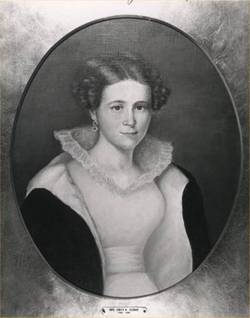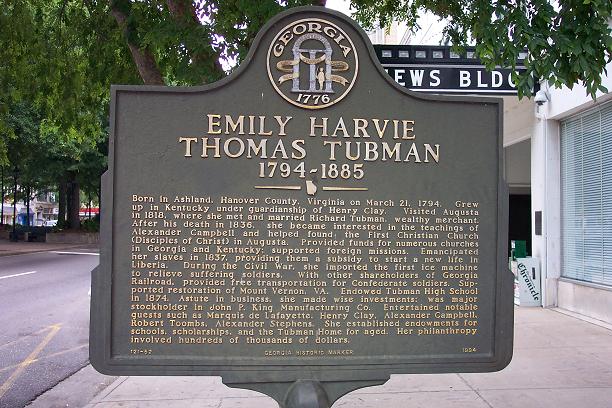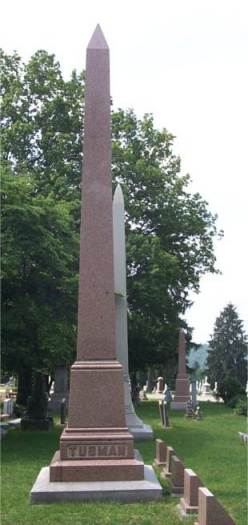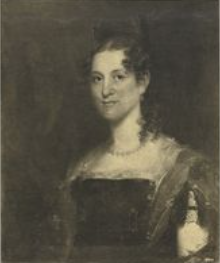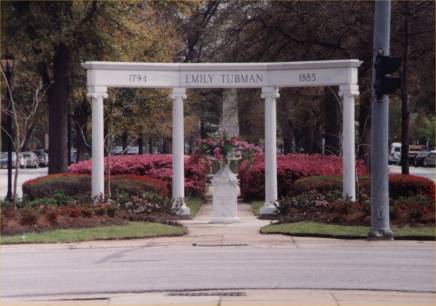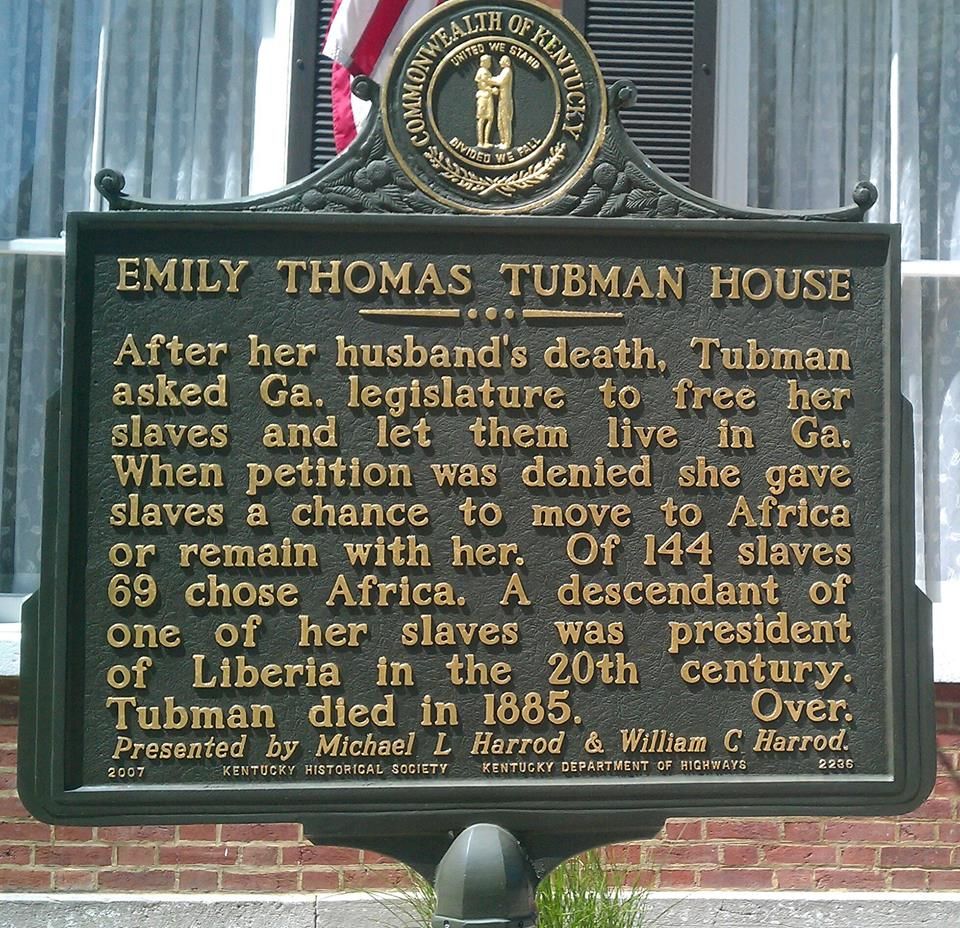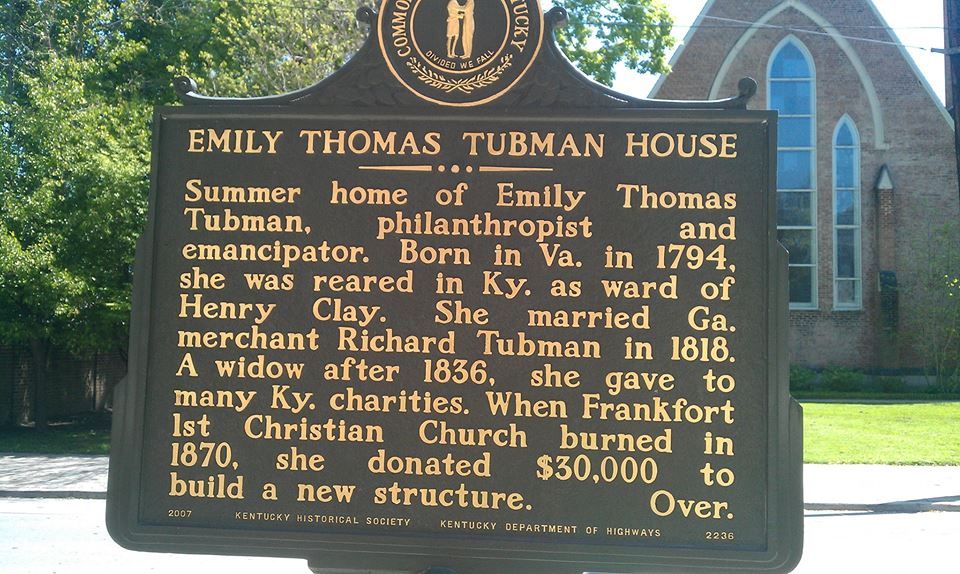MRS. EMILY H. TUBMAN
By GEORGE DARSIE
Though this worthy Christian woman passed to her reward eighteen years ago (in June, 1885) her memory has lost none of its fragrance. Her home was in Augusta, Georgia, but she spent the summer of each year with her brother, the late Lauden A. Thomas, and his family, in Frankfort, Kentucky. She died at the great age of ninety-one. Her dust now sleeps in the beautiful cemetery at Kentucky's capital city. Not alone in the localities where her face was seen and known, but throughout our entire brotherhood, her name is still spoken with affectionate reverence, and her splendid life is still recalled with increasing admiration. No one among our people has ever felt more keenly than she the responsibility of having, or [442] illustrated more royally than she the blessedness of giving. What she did with her large means to help our cause through all the South, but especially in Georgia and Augusta; what she did for our various educational institutions, endowing an entire chair in Bethany College; what she did in aiding scores of young men and women to educate themselves for usefulness in life; what she did by her lavish donations to public and private charity; what she did by her munificent bestowment upon the church at Frankfort, Kentucky, of a complete and furnished church building; what she did by her endowment of the church at Augusta, Georgia, by which she guaranteed its future for all coming time; what she did by her large benefactions to our missionary enterprises, both at home and abroad, and by her final bequest of $30,000 to our Foreign Society, the largest single contribution it has ever received; what she did in all the ways I have thus named, and in other ways of which she permitted no record to be made, to bless mankind and to glorify God, but gives some faint illustration of the sweet-spirited benevolence which filled her long life, even down to the very end. The beauty of her giving lay in its cheerfulness and in the tender heart-gift that went with every contribution she made. In consequence she found great joy and satisfaction in it. Again and again have I heard her say that it was the supreme happiness of her life. But the good she has done by her direct gifts, great as it is, seems to me to be even less than the good she has done and is still doing by the unconscious influence of her great example. Being dead, she yet speaks to our whole generation, and proclaims the truth of Christ's great utterance, to which all human experience bears witness, that "it is more blessed to give than to receive." Mrs. Tubman was baptized by Dr. Silas M. Noel, minister of the Frankfort Baptist church, in the Kentucky river, just below that city, in October, 1828, four years before the organization of the Frankfort Church of Christ. She took with her on her return to Augusta, a certificate of her baptism, but she never held membership in a Baptist church. Soon after this she met Alexander Campbell and accepted with full and hearty confidence, no less than with complete intelligence, the religious views he advocated, becoming from that time on his life-long admirer and friend. She believed implicitly that a return to primitive Christianity, the restoration of the apostolic faith and practice in all their essential features, and the union of God's children on this imperishable basis, was the only hope for the ultimate triumph of the religion of Christ. But while her religious convictions were deep and strong, she had unfailing charity for all who differed from her and loved all of every name who called on the Lord Jesus Christ, out of a pure heart. In her mental characteristics she blended a masculine vigor, grasp and balance with a truly feminine delicacy of insight and intuition. There was no better counselor concerning intricate and perplexing matters of business, or the practical conduct of the affairs of life, and yet she was equally able and wise in all matters of the household art, and things which called for the exercise of the most refined womanly taste and judgement. She had an exquisite sense of the beautiful, which gave her great and constant delight, and yet she was accustomed, on all the important questions of the day, to take the most sober and common sense view of things. Simple in her tastes and manners, natural in her speech and behavior, sincere and genuine in all things, one could approach her as easily as the child its mother. Free from haughtiness and affectation, those who knew her best loved her most, and all who sought her friendship were sure to obtain it. I count it one of the great blessings of my life to have known her and to have learned from her afresh the joy-bringing power of a life spent in doing good. What a glorious example she has left to our great brotherhood, and to Christian people everywhere, of the supreme blessedness of giving! May her great life be like the seed that fell on good ground, which, after its own kind, brought forth thirty, sixty and a hundred fold. --- Churches of Christ, John T. Brown, 442-443.
MRS. EMILY H. TUBMAN
By GEORGE DARSIE
Though this worthy Christian woman passed to her reward eighteen years ago (in June, 1885) her memory has lost none of its fragrance. Her home was in Augusta, Georgia, but she spent the summer of each year with her brother, the late Lauden A. Thomas, and his family, in Frankfort, Kentucky. She died at the great age of ninety-one. Her dust now sleeps in the beautiful cemetery at Kentucky's capital city. Not alone in the localities where her face was seen and known, but throughout our entire brotherhood, her name is still spoken with affectionate reverence, and her splendid life is still recalled with increasing admiration. No one among our people has ever felt more keenly than she the responsibility of having, or [442] illustrated more royally than she the blessedness of giving. What she did with her large means to help our cause through all the South, but especially in Georgia and Augusta; what she did for our various educational institutions, endowing an entire chair in Bethany College; what she did in aiding scores of young men and women to educate themselves for usefulness in life; what she did by her lavish donations to public and private charity; what she did by her munificent bestowment upon the church at Frankfort, Kentucky, of a complete and furnished church building; what she did by her endowment of the church at Augusta, Georgia, by which she guaranteed its future for all coming time; what she did by her large benefactions to our missionary enterprises, both at home and abroad, and by her final bequest of $30,000 to our Foreign Society, the largest single contribution it has ever received; what she did in all the ways I have thus named, and in other ways of which she permitted no record to be made, to bless mankind and to glorify God, but gives some faint illustration of the sweet-spirited benevolence which filled her long life, even down to the very end. The beauty of her giving lay in its cheerfulness and in the tender heart-gift that went with every contribution she made. In consequence she found great joy and satisfaction in it. Again and again have I heard her say that it was the supreme happiness of her life. But the good she has done by her direct gifts, great as it is, seems to me to be even less than the good she has done and is still doing by the unconscious influence of her great example. Being dead, she yet speaks to our whole generation, and proclaims the truth of Christ's great utterance, to which all human experience bears witness, that "it is more blessed to give than to receive." Mrs. Tubman was baptized by Dr. Silas M. Noel, minister of the Frankfort Baptist church, in the Kentucky river, just below that city, in October, 1828, four years before the organization of the Frankfort Church of Christ. She took with her on her return to Augusta, a certificate of her baptism, but she never held membership in a Baptist church. Soon after this she met Alexander Campbell and accepted with full and hearty confidence, no less than with complete intelligence, the religious views he advocated, becoming from that time on his life-long admirer and friend. She believed implicitly that a return to primitive Christianity, the restoration of the apostolic faith and practice in all their essential features, and the union of God's children on this imperishable basis, was the only hope for the ultimate triumph of the religion of Christ. But while her religious convictions were deep and strong, she had unfailing charity for all who differed from her and loved all of every name who called on the Lord Jesus Christ, out of a pure heart. In her mental characteristics she blended a masculine vigor, grasp and balance with a truly feminine delicacy of insight and intuition. There was no better counselor concerning intricate and perplexing matters of business, or the practical conduct of the affairs of life, and yet she was equally able and wise in all matters of the household art, and things which called for the exercise of the most refined womanly taste and judgement. She had an exquisite sense of the beautiful, which gave her great and constant delight, and yet she was accustomed, on all the important questions of the day, to take the most sober and common sense view of things. Simple in her tastes and manners, natural in her speech and behavior, sincere and genuine in all things, one could approach her as easily as the child its mother. Free from haughtiness and affectation, those who knew her best loved her most, and all who sought her friendship were sure to obtain it. I count it one of the great blessings of my life to have known her and to have learned from her afresh the joy-bringing power of a life spent in doing good. What a glorious example she has left to our great brotherhood, and to Christian people everywhere, of the supreme blessedness of giving! May her great life be like the seed that fell on good ground, which, after its own kind, brought forth thirty, sixty and a hundred fold. --- Churches of Christ, John T. Brown, 442-443.
Family Members
Advertisement
Records on Ancestry
Advertisement
